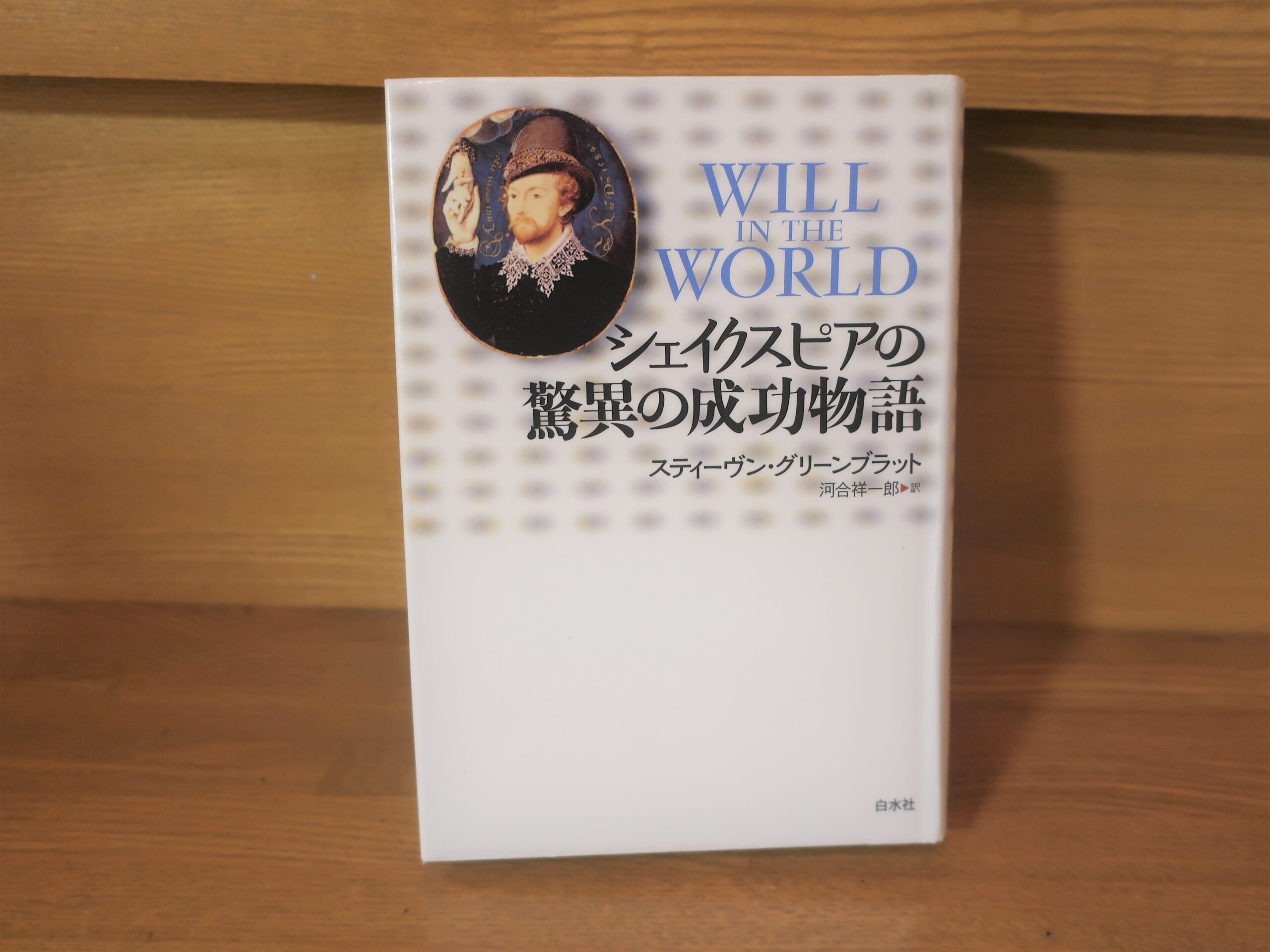S. Greenblatt, "Shakespeare's Amazing Success Story" Summary and Comments - A recommended biography to get to know the Shakespeare who lived with the times!
I would like to introduce "Shakespeare's Amazing Success Story" written by Stephen Greenblatt and translated by Shoichiro Kawai, published by Hakusuisha in 2006.
Let's take a quick look at the book.
Shakespeare not only wrote and performed for the money-sucking entertainment commercial theater, he wrote scripts that were truly sensitive to the social and political conditions of his day. He had to. In order to make ends meet, the theater company in which Shakespeare was a shareholder had to draw approximately 150 to 200 people a day to its round wooden playhouse, and competition with rival theater companies was fierce. (omission) While almost all the rival playwrights were on the road to starvation, Shakespeare had saved enough money to buy the finest house in his hometown and retired in his early fifties, having achieved great success and fame.
This book is an imaginative reading of the great playwright's life and the relationship between his works and his amazing success story since his baptism on April 26, 1564.
What is the relationship between the nursery rhymes you heard as an infant and "King Lear"? What is the connection between the morality plays he may have seen as a boy and his own work? Why did he become an actor in the city of London? What is the connection between the death of his son Hamnet and "Hamlet"? What was the significance of showing "Macbeth" to King James I, who was more interested in witches? ...... Based on the latest research findings, "How did Shakespeare become Shakespeare?" Based on the latest research findings, this presentation will explore the mystery of "How did Shakespeare become Shakespeare?
A national bestseller and a masterpiece that has been praised by every magazine in the United States! In this groundbreaking biography, the leader of the new American historicism reveals the "ambitions" of the world's most famous playwright.
AmazonProducts Page.
What makes this book unique is that it seeks to answer the question, "How did Shakespeare become Shakespeare?" is in its pursuit of this question.
Peter Ackroyd's "A Biography of Shakespeare."The first film, "The Last Time I Saw You," described the historical background in great detail, but this work goes even further into the social background and ideological situation.
The translator's afterword describes the book as follows
This book is Greenblatt's biography of Shakespeare as a story. Unlike the many biographies of Shakespeare that have been written, this is a reading of Shakespeare's character and his relationship to his works. As declared in the Introduction, this is an imaginative reading of Shakespeare's works, and has been criticized by rigorous scholars as being too speculative, but this bold reading should be considered a strength of the book (the fact that it must be speculative is stated in the "Note to the Reader"). The book's boldness in going straight to the heart of the matter is very clever, and above all, it is persuasive because it is well narrated.
Hakusuisha, Stephen Greenblatt, translated by Shoichiro Kawai, Shakespeare's Amazing Success Story, p. 553-555
As you read this biography, you will notice that expressions of the form "Shakespeare may have been ~~" appear many times.
The book speaks of "imaginative speculation," as the commentary above states. The problem is that Shakespeare is an enigmatic writer, and there are many periods when no direct documentation exists.
However, the author thoroughly researches the historical background and from there discusses him in a way that "Shakespeare would have been influenced by this historical background.
Although he may have been criticized by rigorous scholars, he was highly praised by many reviewers because his speculations were not "mere speculation," but because he had a firm grasp of the historical background of the time.
One of the most interesting things to read about was the political situation during Shakespeare's lifetime, especially what the reign of Queen Elizabeth was like for the people, as well as the situation of Christianity in England.
At that time, England had the "Church of England" as its state religion, which was separated from Roman Catholicism.
But the Roman Catholics were not silent about it. The Catholics still did not recognize the Church of England and continued to sabotage it in order to overthrow it.
This book will give you a behind-the-scenes look at the muddle, bloody repression, espionage, and political maneuvering in this area.
I have previously discussed the Spanish Inquisition in this blog, and if you think about it, Shakespeare was alive at that very same time.
The country where the Inquisition was most active was, after all, Spain. But even here in England, there was a system that thoroughly suppressed Catholic saboteurs.
I learned from this book that Shakespeare was walking a dangerous tightrope himself as he continued to write plays under such Christian circumstances. This was very interesting.
The translator's afterword is also stimulating, although it is different from the main text.
The translator gives us the backstory as to why the author, Greenblatt, wrote a biography that is full of "guesses".
In fact, the history of literary criticism in Europe at that time was involved.
To put it in a nutshell, there was the controversy over the "Is the artist and the work separate?
In the past, the main method of understanding a work of art was to interpret it in light of the artist's life and the historical background of the time.
But from this comes the assertion that "the moment a work leaves the writer's hands, it becomes an entity completely separate from the writer, and the reader is free to interpret it.
Regardless of what the author thinks, it is the reader who interprets his or her work, and the inclusion of the author's thoughts or historical background in the work is a way of narrowing the freedom of interpretation. Jacques Derrida, Paul de Man, and others are said to follow this trend.
However, gradually, taking advantage of the freedom of criticism, "criticism for the sake of criticism," as it were, became a state in which anything goes. It has gone too far.
The translator says that Greenwood was chosen because the author's thought and historical background had to be kept in mind as well.
This afterword, which briefly introduces the flow of literary criticism, an industry that is difficult to understand, honestly left more of an impression on me than the main biography, lol.
However, it is still a very highly regarded Shakespeare biography, "Shakespeare's Amazing Success Story". This was a very interesting work to learn about the kind of society in which Shakespeare lived.
I would highly recommend this work as well.
The above is a recommended biography of S. Greenblatt, "Shakespeare's Amazing Success Story" to learn what the society Shakespeare lived in was like! was.
Next Article.
Click here to go to the previous page
Related Articles







































